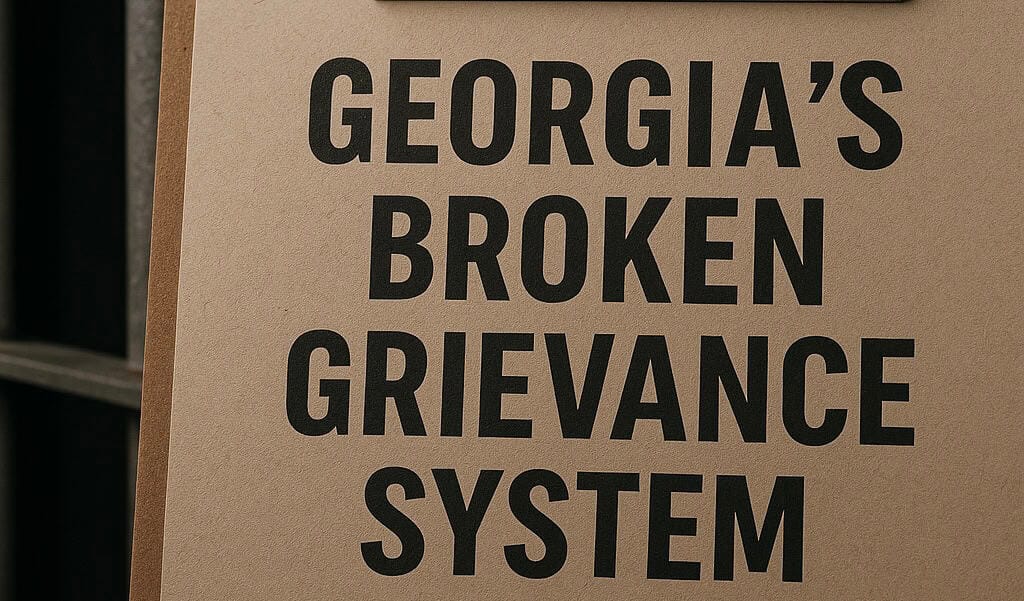In Georgia’s prisons, the system designed to protect incarcerated people from abuse is being used to silence them. The grievance process—supposedly a formal channel for reporting mistreatment, medical neglect, or unsafe conditions—is widely known by prisoners as a trap. For many, attempting to file a grievance doesn’t lead to help. It leads to retaliation.
“In Georgia, a grievance is not confidential and retaliation is assured. For years now, that retaliation has come from officers working with gangs to have the person ‘touched up.’ Some of the deaths in here? They’re hits ordered for filing a grievance.”
That’s not speculation. That’s the lived reality of incarcerated Georgians trapped in a system where justice is a dangerous pursuit.
What the Law Requires—and How It Fails
Under the federal Prison Litigation Reform Act (PLRA), prisoners must “exhaust” the grievance process before they can file a civil lawsuit in federal court. That means reporting abuse, filing forms, appealing denials—all on tight deadlines.
But what happens when officers deny those forms, discard them, or punish prisoners for trying to file them? What if the process itself is weaponized?
That’s exactly what’s happening in Georgia.
In prison after prison, prisoners report that staff:
- Refuse to hand out grievance forms
- Claim grievances were never received
- Backdate denials to make them untimely
- Threaten or physically assault those who file complaints
Even worse, many officers don’t retaliate directly. Instead, they weaponize gang affiliations to do the dirty work. One prisoner explained:
“They don’t need to get their hands dirty. They tell the right inmate what to do, and that inmate handles it. Then the administration gets to say it was inmate-on-inmate violence. No one asks why it happened.”
Why Don’t Prisoners File Lawsuits?
People outside often ask: Why don’t inmates just file a lawsuit? Or a class action? The answer is simple: they can’t.
Even if a prisoner is beaten, sexually assaulted, or denied medical care, if they don’t (or can’t) complete the grievance process first, their lawsuit gets thrown out—no matter how serious the harm.
That’s what makes the grievance system so dangerous. It’s not just broken. It’s a barrier to justice.
Class-action lawsuits in particular require exhaustion of administrative remedies for every class member. In a system like Georgia’s—where exhaustion is practically impossible—class actions rarely get off the ground.
The Cost of Silence
This system has a body count. It’s tied to:
- Suicides from untreated mental health issues
- Overdoses that go unreported or ignored
- Physical assaults with no consequences
- Inmates dying in their cells hours—or days—before being found
No one is held accountable, because no one is allowed to speak up safely.
Meanwhile, families on the outside are told to be patient, to trust the system, to wait for answers. But inside, inmates are punished for even trying to tell the truth.
What Needs to Change
If Georgia is serious about accountability, the grievance system must be rebuilt from the ground up.
Immediate Demands:
• Independent Grievance Oversight Board (not under GDC control)
• Confidential submission process that cannot be intercepted by staff
• Protection from retaliation for anyone filing a grievance
• Whistleblower hotline for families and prisoners to report misconduct
• Digital tracking of grievances with inmate access to status updates
Legislative Fixes:
• Amend the PLRA to allow exceptions when retaliation, obstruction, or systemic failure prevents grievance filing (A new U.S. Supreme Court ruling addresses some issues.)
• Require audits of all facilities where grievance processing appears suspicious or retaliatory
A Quote from the Inside
“You ever wonder why the time of death and time of report never match on those coroner reports? Because they leave people to die. They’re not doing wellness checks. They’re not responding. And when someone tries to speak up about it, they disappear the paper—or the person.”
This isn’t just misconduct. It’s a system of organized suppression. It’s why people die without answers. And why so many suffer in silence.
How You Can Help
This system won’t change on its own. It’s designed to protect itself, not the people trapped inside it.
You can take action:
• Visit ImpactJustice.AI to send messages to lawmakers, oversight agencies, and media outlets demanding independent grievance oversight. Reference this article by copying the URL into the “Add additional information for the AI” window.
• Call or write your state legislators and ask them what they’re doing to ensure prisoners can safely report abuse.
• Share this story and others like it. Shine light into the dark corners of this system.
Grievances aren’t just paperwork. In prison, they’re lifelines. And in Georgia, those lifelines are being cut.
It’s time we reconnect them.
Learn more about grievance issues in Georgia Prisons:
From Kangaroo Courts to Chaos: Georgia’s Prison Crisis
Reporting Prisoner Safety Concerns in Georgia
Georgia Inmate Grievance System Overview
Invisible Scars: How Georgia’s Prisons Perpetuate Trauma and Abuse


1 thought on “No Way Out: How Georgia’s Broken Grievance System Silences Prisoners and Shields Abuse”